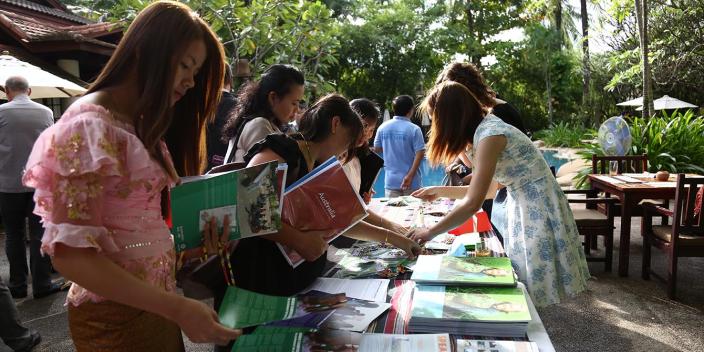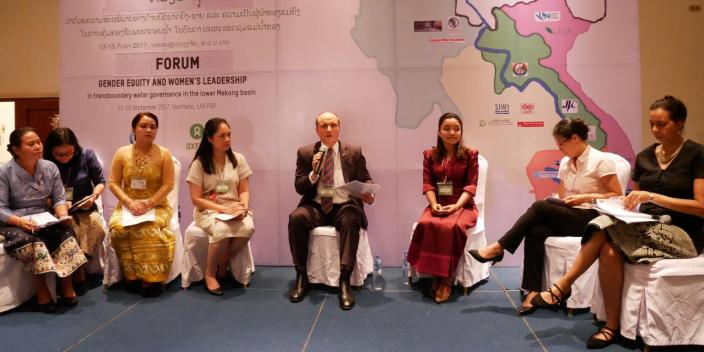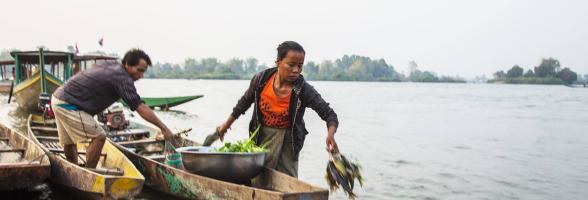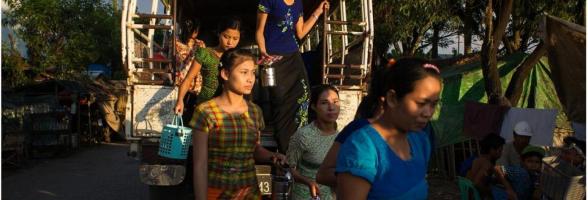“To make sure if we have gender balance or gender equality in water governance issues, we need to start from a household level, from the culture and traditional aspect and move to policy aspect.”
More than 80 people including government representatives of the Mekong countries, Australian Embassy, Civil Society, MRC, UNDP and national and international organizations joined a two and half-day regional forum to discuss gender equity and women’s leadership in transboundary water governance in the lower Mekong basin. The forum was organized by Oxfam and the International Union for Conservation of Nature (IUCN) on 13 to 15 September 2017, Vientiane, Lao PDR.
In the Mekong, the role of women in decision making in water resource management is still very limited even though they are responsible for water fetching, food production and family subsistence. Women are often excluded from decision-making and information sharing regarding the access to and use of water resources both at the household level but also at national and regional levels. This lack of women’s involvement in decision-making is crucial and has been overwhelmingly recognized by stakeholders including the international community.
“What is the key challenge for women to meaningfully participate in decision making on water resource management?” this question was facilitated by the Australian Ambassador in Laos, H.E John William, for a Q &A session with panelists from government representatives of the Mekong countries.
In Lao, the Deputy Director General of the Department of Women Development, Mde. Kaysamy Latvilayvong, said there are some successes in the field of gender and environment protection including water resource management but there are still various constraints.
“Gender equity and environmental protection are newly established works and the knowledge and experiences are very limited for women in Lao PDR,” said Mde. Kaysamy, “Public awareness on gender equity in water resource management and environment protection is still low including lacking of information, education and communication (IEC) materials on gender and environment protection in Lao language.”
“Woman is a main person who takes care and has responsibility to collect the water- from 4 to 5 hours a day.” said Ms. Tran Thu Thuy- Director of General Office of the Vietnam Women’s Union. “We need to do something such as research studies, or survey to identify women’s problems and seek solutions to improve women’s role in water resource management.”
Ms.Hla Hla Htwe- Deputy Director Environmental Conservation Department, Ministry of Natural Resources and Environmental Conservation from Myanmar said there is a need for women in the leadership role because most of the places, the percentage of women involved in leadership role is very little.
“Practically in my department, I am the only woman in the decision-making role and I work with other eight men in the head department. So for women to catch up the leadership and decision-making role, women should have to improve their skills, knowledge and technologies as well as try to be smart and professional,” said Ms. Hla Hla Htwe.

Besides hearing the discussion from high-level panelists, this forum also created a platform to expand and build a network of ‘gender champions’ from different sectors who have applied their knowledge and influence in both the national and regional policy arena and in the implementation of water related programmes and initiatives on the ground.
John Saw Bright, a participant from Karen Environmental and Social Action Network in Myanmar, learned from the forum that there is still a lot of work to do around gender equity and women empowerment in water resource management in this region.
John said, “To make sure if we have gender balance or gender equality in water governance issues, we need to start from a household level, from the culture and traditional aspect and move to policy aspect.”
Thou Touch, Community Rights and Hydropower Development coordinator from NGO-Forum, said that he thinks this regional forum is very important for our network members, especially women. He wants Oxfam, IUCN and other NGOs to continue this kind of forum because it creates the opportunity for women to bring all the issues from the grassroots to talk and discuss regionally.
This is a great move for Oxfam to advance gender in water governance together with partners in the region, said Ratana Hourn, Inclusion Project Monitoring, Evaluation and Learning (MEL) coordinator, Oxfam. “We have identified strategies and key changes that we want to see in gender in trans-boundary water governance within the next two years, and plan for how we will coordinate our efforts to influence this change”.


